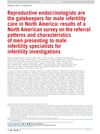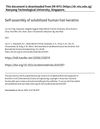 42 citations,
March 2018 in “PLOS Biology”
42 citations,
March 2018 in “PLOS Biology” Autophagy is important for human hair growth and health.
 38 citations,
July 2021 in “ACS Nano”
38 citations,
July 2021 in “ACS Nano” Microneedles help treat hair loss by improving hair surroundings and promoting growth.
 33 citations,
January 2021 in “Aesthetic Surgery Journal”
33 citations,
January 2021 in “Aesthetic Surgery Journal” Low-Level Light Therapy (LLLT) is a safe and effective method for skin rejuvenation, acne treatment, wound healing, body contouring, and hair growth, but more well-designed trials are needed for confirmation.
 32 citations,
January 2021 in “Molecules”
32 citations,
January 2021 in “Molecules” Some Middle Eastern plants may help treat diabetes and could be alternatives to current drugs, but more research is needed.
 31 citations,
January 2019 in “Journal of Cutaneous Medicine and Surgery”
31 citations,
January 2019 in “Journal of Cutaneous Medicine and Surgery” Platelet-Rich Plasma (PRP) therapy can promote hair growth and improve facial aesthetics, including reducing acne scars and facial burns, and it works best with three initial monthly injections.
 26 citations,
July 2019 in “Fertility and Sterility”
26 citations,
July 2019 in “Fertility and Sterility” Reproductive gynecologists are the main referrers for male infertility evaluations in North America.
 26 citations,
April 2019 in “Journal of Cosmetic Dermatology”
26 citations,
April 2019 in “Journal of Cosmetic Dermatology” Herbal alternatives like saw palmetto and green tea may offer safe, effective treatment for hormonal hair loss.
 25 citations,
July 2017 in “Archives of Dermatological Research”
25 citations,
July 2017 in “Archives of Dermatological Research” Herbal products might promote hair growth with fewer side effects, but more research is needed to confirm their safety and effectiveness.
 24 citations,
June 2021 in “Agronomy”
24 citations,
June 2021 in “Agronomy” Protein hydrolysates applied to roots or leaves differently improved lettuce yield and quality, with the best results seen in specific combined treatments for each type.
 24 citations,
January 2014 in “The American Journal of Chinese Medicine”
24 citations,
January 2014 in “The American Journal of Chinese Medicine” The leaves of Platycladus orientalis have potential health benefits but require more research for safety and understanding how they work.
 23 citations,
January 2018 in “Elsevier eBooks”
23 citations,
January 2018 in “Elsevier eBooks” Nanoemulsions improve stability and delivery of active ingredients in cosmetics for skin and hair care.
 19 citations,
November 2017 in “Journal of Pharmaceutical Sciences”
19 citations,
November 2017 in “Journal of Pharmaceutical Sciences” A new gel containing minoxidil can treat hair loss effectively, potentially reducing side effects and improving treatment.
 14 citations,
April 2021 in “Biology”
14 citations,
April 2021 in “Biology” Thai rice bran extracts, especially from Tubtim Chumphae rice, can significantly reduce the activity of hair loss genes, with x-tocopherol showing potential as an anti-hair loss product.
 12 citations,
March 2010 in “Revista iberoamericana de micología”
12 citations,
March 2010 in “Revista iberoamericana de micología” The cat died from a hard-to-treat fungal infection despite various treatments.
 11 citations,
September 2020 in “Journal of Cosmetic Dermatology”
11 citations,
September 2020 in “Journal of Cosmetic Dermatology” Silver nanoparticles can significantly promote hair growth.
 10 citations,
June 2019 in “International Journal of Cosmetic Science”
10 citations,
June 2019 in “International Journal of Cosmetic Science” Some plant-based chemicals may help with hair growth, but more research is needed to confirm their effectiveness.
 10 citations,
January 2017 in “Journal of Evidence-Based Complementary & Alternative Medicine”
10 citations,
January 2017 in “Journal of Evidence-Based Complementary & Alternative Medicine” Some vegetables from Northern Thailand show promise for health benefits, including hair loss treatment and antioxidant properties.
 9 citations,
September 2016 in “Medical Clinics of North America”
9 citations,
September 2016 in “Medical Clinics of North America” Eating less and exercising more, with personalized diet plans and realistic goals, can lead to weight loss and better health, but more research is needed for long-term success.
 8 citations,
April 2019 in “International journal of scientific research in biological science”
8 citations,
April 2019 in “International journal of scientific research in biological science” Tridax procumbens is a widely used medicinal plant with many health benefits.
 7 citations,
December 2020 in “ACS biomaterials science & engineering”
7 citations,
December 2020 in “ACS biomaterials science & engineering” Human hair keratins can form stable nanofiber networks that might help in tissue regeneration.
 7 citations,
December 2020 in “Pharmaceutics”
7 citations,
December 2020 in “Pharmaceutics” A mix of tocopherol acetate and L-menthol helps grow hair better than using them separately or using minoxidil.
 5 citations,
November 2017 in “Asian journal of pharmaceutical and clinical research”
5 citations,
November 2017 in “Asian journal of pharmaceutical and clinical research” Pakis Gajah (Angiopteris evecta) water extract may promote hair growth in rabbits, but more research is needed for human use.
 4 citations,
May 2020 in “Dermatologic Therapy”
4 citations,
May 2020 in “Dermatologic Therapy” Redenyl lotion effectively promotes hair growth and improves quality of life for androgenetic alopecia patients.
 4 citations,
April 2020 in “Facial Plastic Surgery Clinics of North America”
4 citations,
April 2020 in “Facial Plastic Surgery Clinics of North America” Hair loss in women is complex to diagnose and treat, and hair restoration should be done by experts. Using minoxidil before surgery can help manage post-surgery hair shock loss. The Follicular Unit Transplantation method is recommended for women due to its speed, no need for shaving, and better graft quality. Strategies like L, T, and reverse L patterns can help restore central hair density, and regenerative methods can improve graft survival in hair transplants.
 4 citations,
January 2018 in “Elsevier eBooks”
4 citations,
January 2018 in “Elsevier eBooks” Hormones are crucial for regulating body functions and imbalances can lead to health issues.
 4 citations,
February 2017 in “Journal of Cutaneous Medicine and Surgery”
4 citations,
February 2017 in “Journal of Cutaneous Medicine and Surgery” Compounds from certain trees used by First Nations people show potential for treating skin conditions and promoting hair growth, but more research is needed to confirm their safety and effectiveness.
 4 citations,
January 2016 in “Journal of analytical & bioanalytical techniques”
4 citations,
January 2016 in “Journal of analytical & bioanalytical techniques” The herbal hair gel could be a safe hair growth treatment with minimal side effects.
 3 citations,
June 2022 in “Dermatology and therapy”
3 citations,
June 2022 in “Dermatology and therapy” A new botanical treatment improved hair growth and symptoms in lichen planopilaris patients.
 3 citations,
May 2021 in “Dermatologic Clinics”
3 citations,
May 2021 in “Dermatologic Clinics” The document concludes that more research is needed to understand hair loss in men and to find new treatments.
 3 citations,
July 2020 in “International Journal of Molecular Sciences”
3 citations,
July 2020 in “International Journal of Molecular Sciences” SCDSFs from zebrafish embryos are beneficial for treating cancer, regenerating tissues, and improving conditions like psoriasis and alopecia.






























